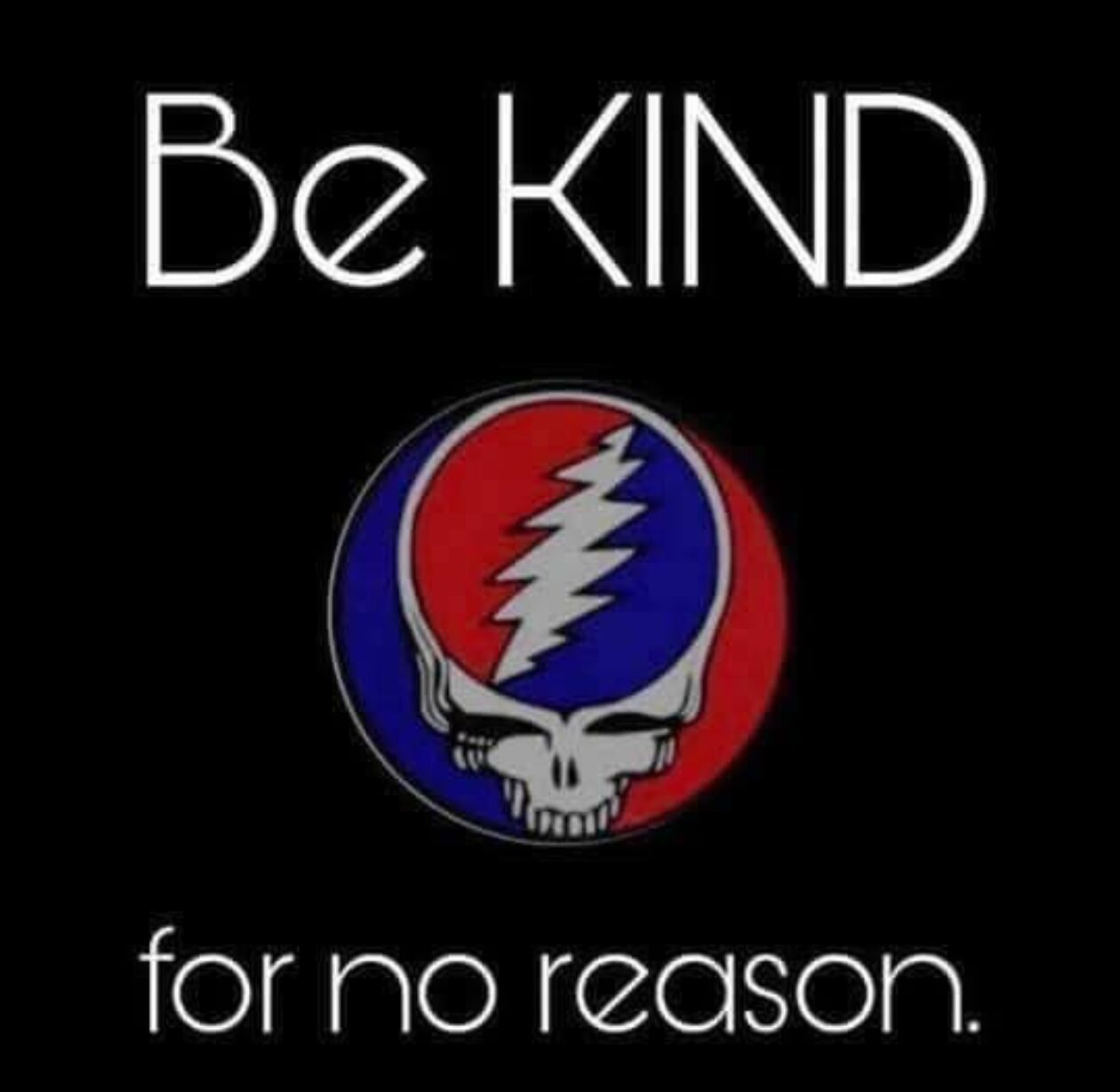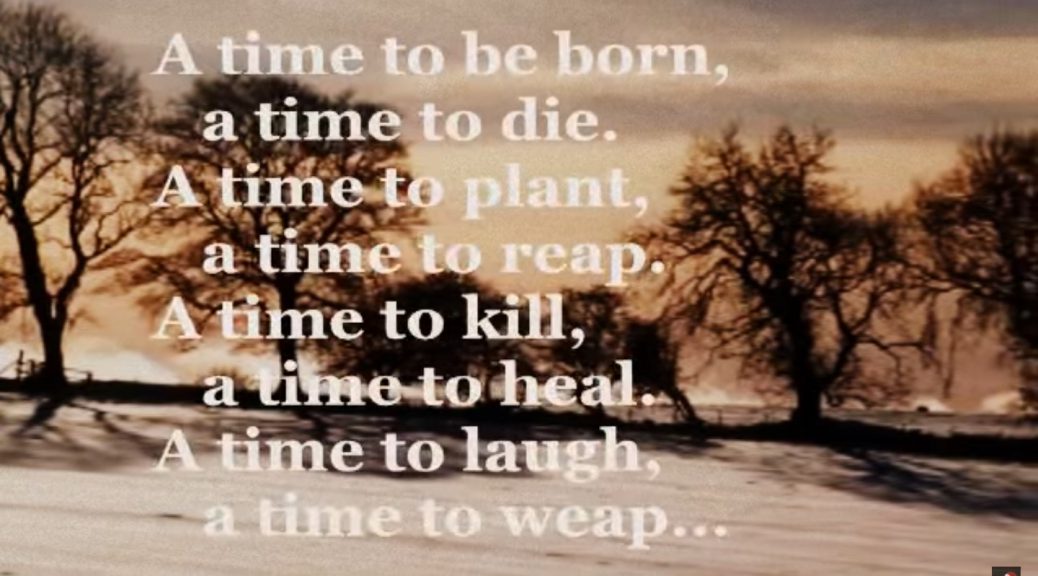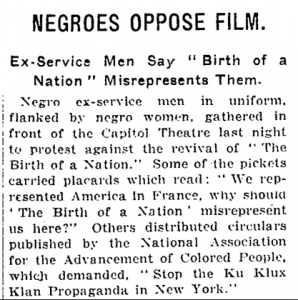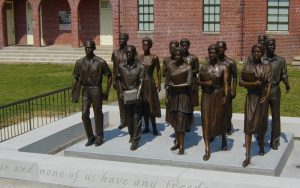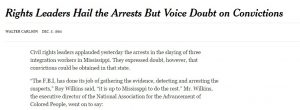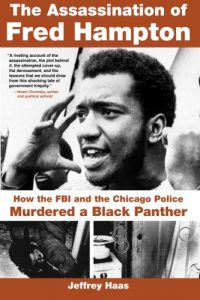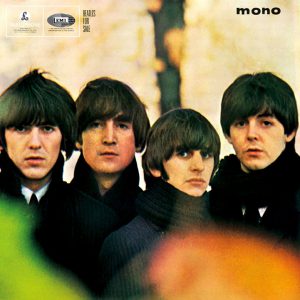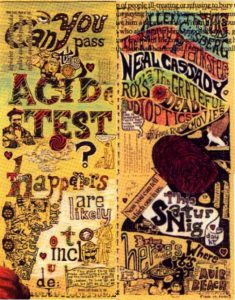December 4 Peace Love Art Activism
BLACK HISTORY
Roberts v The City of Boston
December 4, 1849: the case of Roberts v The City of Boston began on behalf of Sarah Roberts, a Black five-year-old who was barred from school. The suit was heard by the Massachusetts Supreme Court and the judge presiding was Chief Justice Lemuel Shaw. The lawsuit was part of an organized effort by the African-American community to end racially segregated schools. A city ordinance passed in 1845 had said any child “unlawfully excluded from the public schools” could recover damages (which meant they could sue the city). Sarah had been forced to walk past five other schools to reach the “colored” school in Smith Court.
School authorities argued that special provisions had been made for “colored” students. Since Boston maintained racially segregated schools, that Sarah passed five White schools on her way to the black schools, the school board contended, was of no consequence. Roberts retained the talented attorney, abolitionist, and later United States Senator Charles Sumner. Sumner worked with Robert Morris, a young Black abolitionist and activist lawyer from Boston. This formidable legal team broke new ground in their argument before the court. Invoking “the great principle” embodied in the Constitution of Massachusetts, they asserted that all persons, regardless of race or color, stand as equals before the law. (see Sarah Roberts for expanded chronology) (SD, see In April, 1850)
Dred Scott
Late 1849 or early 1850: Irene Emerson left Missouri for Springfield, Massachusetts. In 1850 she married Dr. Calvin C. Chaffee, a Springfield physician with antislavery leanings who later became a Republican congressman. Although no longer in Missouri, Irene Emerson remained the defendant in Dred Scott’s freedom suit before the Missouri state courts. Her brother, a prosperous New York merchant with strong personal and professional ties to St. Louis, continued to act on her behalf in defending the case and would become the named defendant in the federal case. (see Dred Scott for expanded chronology)
December 4, 1915: the NAACP led protest demonstrations against the showing of the movie The Birth of a Nation. The racism that African Americans experienced in both the South and the North during the war years could be glimpsed in many arenas of American life, including the movies. It is not surprising, perhaps, that The Birth of a Nation, which appeared in March 1915, was both one of the landmarks in the history of American cinema and a landmark in American racism.
Historian Thomas Cripps has characterized The Birth of a Nation as “at once a major stride for cinema and a sacrifice of black humanity to the cause of racism.” Based on two historical novels, The Clansman, An Historical Romance of the Ku Klux Klan (1905) and The Leopard’s Spots: A Romance of the White Man’s Burden, 1865 – 1900 (1902), and a play, The Clansman (1906), written by a North Carolina lawyer turned preacher, Thomas Dixon Jr., The Birth of a Nation recounts the history of the Civil War and Reconstruction through the eyes and experiences of Southern whites who vehemently opposed the political and social progress made by newly freed African Americans after the Civil War. Much of the novel’s tone, which Cripps describes as “a nightmare of interracial brutality, rape and castigation,” found its way into The Birth of a Nation. (next BH, see Dec 8)
Winfred Lynn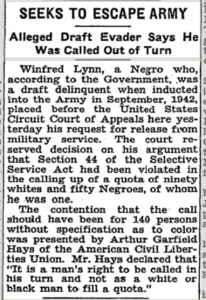
December 4, 1942: Winfred Lynn, an African-American landscape gardener on Long Island, New York, challenged the racially segregated draft in World War II. Lynn’s challenge cited the 1940 Selective Service Act, which included a racial non-discrimination clause. Although rarely mentioned by historians, the clause in the Selective Service Act was arguably the first federal civil rights law of the twentieth century.
On September 27, 1940, civil rights leader A. Philip Randolph had confronted President Franklin D. Roosevelt in the White House about his failure to implement the non-discrimination clause of the law, but without success.
The NAACP refused to take Lynn’s case, regarding it as too controversial in the midst of wartime. Arthur Garfield Hays, general counsel for the ACLU, agreed to handle the case. The Federal District Court in Brooklyn on this day denied Lynn’s writ of habeas corpus and dismissed the case. On February 3, 1944 the Second Circuit Court of Appeals, by a 2-1 vote, upheld the lower court decision. [ACLU story] (see June 20, 1943 for more; next BH, see Dec 8)
School desegregation–Clinton, Tennessee
December 4, 1956: Clinton, Tennessee’s Rev. Paul Turner, the white minister of the First Baptist Church, was severely beaten after escorting the “Clinton 12” to school.
The twelve students were Jo Ann Allen (now Boyce), Bobby Cain, Theresser Caswell, Minnie Ann Dickey (now Jones), Gail Ann Epps (now Upton), Ronald Hayden, William Latham, Alvah J. McSwain (now Lambert), Maurice Soles, Robert Thacker, Regina Turner (now Smith), and Alfred Williams. A bronze statue of the “Clinton Twelve” is now displayed outside a newly-remodeled front entrance to the former Green McAdoo School, where the twelve students had attended elementary school. [Black Then article] (SD, see May 17, 1957)
Louis Armstrong
In 1957: although the blues and folk music had often been associated with protest music, jazz also had its contributors.
The usually low-key Louis Armstrong cancelled a State Department-sponsored tour of the USSR in 1957. “The way they are treating my people in the South, the government can go to hell. The people over there ask me what’s wrong with my country. What am I supposed to say?” [2007 NYY story] (see January 10, 1957)
Murders of Three Civil Rights Workers
December 4, 1964: FBI agents arrested 19 Mississippi men on federal conspiracy charges in connection with the slayings of three civil rights workers, James Chaney, Andrew Goodman and Michael Schwerner, in Mississippi. (next BH, see Dec 6; see Murders for expanded chronology)
Black Panthers assassinated
December 4, 1969: 14 police officers assassinated Black Panthers Fred Hampton, 21, and Mark Clark, 22, as they slept in their Chicago apartment. About a hundred bullets had been fired in what police described as a fierce gun battle with members of the Black Panther Party. However, ballistics experts later determined that only one of those bullets came from the Panthers’ side.
In addition, the “bullet holes” in the front door of the apartment, which police pointed to as evidence that the Panthers had been shooting from within the apartment, were actually nail holes created by police in an attempt to cover up the attack. Four other Black Panthers were wounded in the raid, as well as two police officers.(contemporary NYT article) (next BH & BP, see Dec 8)
Johnnie Mae Chappell
December 4, 2002: nearly four decades after a Johnnie Mae Chappell was slain [March 23, 1964], President George W. Bush requested the Justice Department review the killing and police investigation which followed.
Former Jacksonville police detective Lee Cody, who, along with his partner, was fired by the department for investigating the killing of Johnnie Mae Chappell without authorization, had written to Bush and asked for assistance.
Cody received a letter from the White House which said it had sent his “inquiry to the Department of Justice, which will review your correspondence.”
“I can prove what I’m saying,” Cody said. (BH, see January 6, 2003; Chappell, see March 26, 2003)
James C. Anderson
December 4, 2012: William Montgomery, 23, pleaded guilty to hate crime charges in the killing of James Anderson (see June 26, 2011). Three others had already pleaded guilty and awaited sentencing. Montgomery did not participate in running over Anderson. Another suspect, Jonathan Gaskamp, 20, also pleaded guilty to hate crimes charges in assaults against other blacks. (see January 17, 2103)
Laquan McDonald
December 4, 2018: Cook County Judge Domenica Stephenson denied defense requests for directed acquittals in the trial of the three Chicago police officers charged with lying about the shooting of Laquan McDonald.
Stephenson rejected the defense contention that prosecutors failed to prove their case. Stephenson was hearing the case in a bench trial, without a jury. [CBS News article]
December 4 Peace Love Art Activism
Feminism
Lucy Burns
December 4, 1916: Lucy Burns, along with four other women, took strategic positions in the front row of the visitors’ gallery during President Wilson’s formal address to Congress. They unfurled a banner that read, “Mr. President, What Will You Do for Woman Suffrage?” (see January 8, 1917)
Dianne Feinstein
December 4, 1978: Dianne Feinstein became San Francisco’s first woman mayor when she was named to replace George Moscone, who had been assassinated. (see February 15, 1979)
Women’s Health
December 4, 2012: the Oklahoma Supreme Court struck down two anti-abortion laws. In two separate opinions the Court ruled unconstitutional laws requiring women seeking abortions to have an ultrasound image placed in front of them while they hear a description of the fetus, and that ban off-label use of certain abortion-inducing drugs. (NYT article) (see January 6, 2013)
December 4 Peace Love Art Activism
The Red Scare
December 4, 1947: President Harry Truman had ordered the creation of an Attorney General’s List of Subversive Organizations as part of his Federal Loyalty Program, which he established on March 21, 1947. The list was officially published in the Federal Register on this day. The list became a quasi-official blacklist, as members of listed organizations lost jobs or suffered other penalties because of their association with alleged left-wing organizations. Organizations had no way to protest or appeal being listed, and individuals were labeled subversive even though they had quit the organizations years before, or had only had a brief association in the first place.
The Attorney General’s List encouraged other lists that were used to label and blacklist people. (see Dec 14)
December 4 Peace Love Art Activism
December 4 Music et al
I Want To Hold Your Hand
December 4, 1963: Capitol Records issued a press release announcing that it will begin selling the Beatles’ first U.S. 45 rpm single, “I Want To Hold Your Hand,” on Monday, January 13th, 1964. (also see Busy Beatle December 1963) (next Beatles, see Dec 6)
Beatles for Sale
December 4, 1964, The Beatles: UK release, Beatles for Sale. (next Beatles, see Dec 15)
Future Woodstock Performers
December 4, 1965 the former Warlocks, played their first show as the Grateful Dead in San Jose, CA at the second of Ken Kesey’s Acid Tests. (Jerry Garcia, age 23; Phil Lesh, age 25; Pigpen, age 20; Bob Weir, age 18; Bill Kreutzmann, age 19). Owsley Bear Stanley participated for the first time. (FWP, see “In June Music”; LSD, see December 11; Dead, see Dec 10)
“Turn! Turn! Turn!”
December 4, 1965, “Turn! Turn! Turn!” by the Byrds #1 on the Billboard Hot 100.
December 4 Peace Love Art Activism
Space Race
December 4 – 18, 1965: American astronauts Frank Borman and Jim Lovell fly Gemini 7 for fourteen days, setting an endurance record for that time. (next SR, see Dec 15 – 16)
December 4 Peace Love Art Activism
US Labor History
César E. Chávez, Dolores Huerta, and the UFW
December 4, 1970, : Superior Court Judge Gorden Cambell sentenced Chávez to ten days in jail for violating an injunction prohibiting the lettuce boycott against growers who did not have contracts with his union. Coretta Scott King and Ethel Kennedy, visited Chavez in jail. [NYT article] (see Dec 24, 1970)
United Auto Workers
December 4, 2015: the United Auto Workers won a victory in Chattanooga, Tenn., as a group of skilled tradesmen successfully voted to create a collective bargaining unit at Volkswagen AG’s only U.S. plant. The vote pertains to a small group of skilled tradesmen but allows the UAW to set up a bargaining unit for them to negotiate for wages, benefits and work rules with the German auto maker, and will open the door to wider representation. The group includes a little more than 160 electricians, welders and other repair workers that maintain the assembly line. (see March 29, 2016)
December 4 Peace Love Art Activism
TERRORISM
Charles Hegna
December 4, 1984: four armed men seized a Kuwaiti airliner en route to Pakistan and forced it to land in Tehran, where the hijackers killed American passenger Charles Hegna. (see Dec 9)
Terry Anderson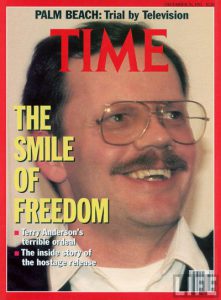
December 4, 1991: militants in Lebanon released kidnapped American journalist Terry Anderson after 2,454 days in captivity. (see October 12, 2000)
December 4 Peace Love Art Activism
Somalia
December 4, 1992: U.S. military forces land in Somalia. (see January 3, 1996)
December 4 Peace Love Art Activism
CLINTON IMPEACHMENT
December 4, 1998: lawyers for President Bill Clinton asked the House Judiciary Committee for three to four days to make their defense presentation. (see Clinton for expanded chronology)
December 4 Peace Love Art Activism
Native Americans & Environmental Issues
December 4, 2016: federal officials announced that they would not approve permits for construction of the Dakota Access Pipeline beneath a dammed section of the Missouri River that tribes said sat near sacred burial sites.
The decision was a victory for hundreds, perhaps thousands, of protesters camped near the construction site who had opposed the project because they said would it threaten a water source and cultural sites. Federal officials had given the protesters until tomorrow to leave a campsite near the construction site.
In a statement, the Department of the Army’s assistant secretary for Civil Works, Jo-Ellen Darcy, said that the decision was based on a need to explore alternate routes for the pipeline crossing. “Although we have had continuing discussion and exchanges of new information with the Standing Rock Sioux and Dakota Access, it’s clear that there’s more work to do,” Ms. Darcy said. “The best way to complete that work responsibly and expeditiously is to explore alternate routes for the pipeline crossing.” (NA, see Dec 29; Env, see Dec 5)
December 4 Peace Love Art Activism
Colin Kaepernick
December 4, 2017: Time magazine announced that Colin Kaepernick was a finalist for their Person of the Year award. (see Dec 5)
December 4 Peace Love Art Activism
Nuclear/Chemical News
December 4, 2018: Secretary of State Mike Pompeo announced that the Trump administration would begin the formal process to scrap the landmark Intermediate-Range Nuclear Forces Treaty within 60 days unless Russia returns to compliance with the treaty’s terms. [NYT article]
December 4 Peace Love Art Activism
Sexual Abuse of Children
December 4, 2019: The Vatican announced that Pope Francis had accepted the resignation of Bishop Richard Malone. No reason was immediately given. All bishops are required to submit their resignation to the Pope when they turn 75. Malone was 73.
For more than a year, thousands of Catholics in Buffalo had pleaded, protested and prayed for his resignation. They had circulated petitions, held placards at prayer vigils, even tried to meet Malone’s plane at the airport.
Both the FBI and New York’s Attorney General were investigating clergy abuse and cover ups in the Buffalo diocese, according to the Buffalo News. The newspaper had also reported that more than 220 lawsuits have been filed against the diocese alleging clergy abuse. Already, Buffalo has paid abuse survivors more than $175 million through a victim’s compensation fund. [CNN article] (next SAoC, see February 18, 2020)
December 4 Peace Love Art Activism
Trump Impeachment Inquiry/Public
December 4, 2019: the House Judiciary Committee began assessing what action to take and what articles of impeachment to draft, if it decided to draft them.
Chairman Jerry Nadler, D-N.Y., invited witnesses because he said the members of the Judiciary Committee needed to understand the historical and legal context for impeachment in deciding how to proceed.
Three professors of law—Noah Feldman of Harvard Law School, Pamela Karlan of Stanford University, and Michael Gerhardt of the University of North Carolina—told the Judiciary Committee that they worried deeply about Trump’s actions in the Ukraine affair —and thought they appeared to justify the power of impeachment as enshrined in the Constitution by its framers.
A fourth witness–Jonathan Turley of George Washington University Law School—said he personally opposed Trump, differed with the three saying the factual case so far developed against Trump would cheapen impeachment and create a dangerous precedent both for Congress and the executive branch. [NYT article] (see TII/P for expanded chronology)
December 4 Peace Love Art Activism
Cannabis
December 4, 2020: in a 228 to 164 vote, the U.S. House of Representatives approved the Marijuana Opportunity, Reinvestment and Expungement (MORE) Act, a bill to federally legalize marijuana.
The vote was mostly along party lines, five Republicans supported the reform and six Democrats opposed it.
Under MORE, cannabis would be federally descheduled and those with prior convictions would have their records expunged. The descheduling provisions would be retroactive, too.
Despite the unprecedented House victory for reformers, few believe the legislation stands a chance in the Republican-controlled Senate, at least before the end of the current Congress early next month. Vice President-elect Kamala Harris (D-CA) was the lead sponsor of the Senate companion version of the bill. [MM article] (next Cannabis, see or see CCC for expanded chronology.
December 4 Peace Love Art Activism
Immigration History
December 4, 2020: Judge Nicholas G. Garaufis of the U.S. District Court in Brooklyn ordered the Trump administration to fully restore the Deferred Action for Childhood Arrivals (DACA), an Obama-era program designed to shield young, undocumented immigrants from deportation, dealing what could be a final blow to President Trump’s long-fought effort to end the protections.
President Obama created DACA in 2012 and since then it protected more than 800,000 individuals, known as “dreamers,” who met a series of strict requirements for eligibility.
But those protections had been under legal and political siege from Republicans for years, leaving the immigrants who were enrolled in DACA uncertain whether the threat of deportation from the United States would quickly return with a single court order or presidential memorandum.
Garaufis directed the administration to allow newly eligible immigrants to file new applications for protection under the program, reversing a memorandum issued in the summer by Chad Wolf, the acting secretary of Homeland Security, which restricted the program to people who were already enrolled. As many as 300,000 new applicants could now be eligible, according to the lawyers who pushed for the reinstatement. [NYT story] (next IH, see January 12, 2021; next DACA, see January 20, 2021)
